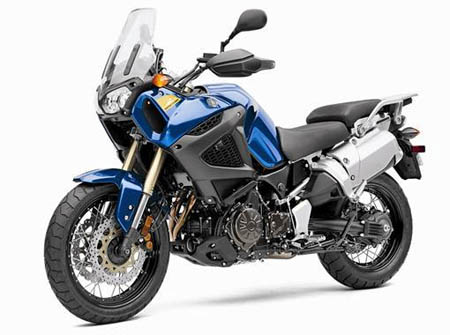U.S. Super Ténéré Deliveries To Be Completed by August 2011
May 3, 2011 – We express our heartfelt sorrow and support for the Japanese people for their great losses and efforts to rebuild the nation.
Don’t forget that assistance for many hundreds of thousands of people who were affected by this tragedy is still required. You can help by contributing to the Japanese Red Cross Society.
May 27, 2011 – Yamaha has now informed U.S. retailers that deliveries of the Super Ténéré to PDP customers (Priority Delivery Program) will be completed by August 2011. Any PDP customers who cancelled their order and would like to reinstate it based on the new delivery date are invited to do so.
(NOTE: The following report was based on the information that was available as of May 3, 2011 and may no longer be applicable).
The unbelievable combination of disasters that took place in Japan in March have caused massive problems for Japanese manufacturers and exports.
The problems are beginning to be felt in the United States and around the world and the motorcycle industry is not exempt.
Yamaha headquarters are located nearly as far south of Tokyo as the earthquake zone is to the north, yet the total destruction of power grids, roads, and life in general have resulted in immense disruptions to the country’s supply chain.
Even the Motegi racing complex was shut for about a month, postponing the Japanese Grand Prix until October and delaying Honda’s test for their new 2012 MotoGP 1000 cc bike.
In addition, nuclear power provides a significant percentage (29%) of power in Japan and the loss of multiple power plants means that companies throughout the country are conserving power by working a reduced number of days per week.
Large-scale reductions at manufacturers of complete vehicles are now the norm, with companies such as Toyota and Honda and their suppliers having been affected. For example, the production of tires from Bridgestone has created delays for all of their customers in the motorcycle and automobile industries.
Super Ténéré Production and Delivery
As a result of the problems in Japan, Yamaha announced recently that deliveries of the Super Ténéré (report), originally planned to start in Spring of 2011, will also be delayed.
Find out here…
Yamaha introduced the the XTZ1200 Super Ténéré to the rest of the world as a 2010 model, with plans to bring it to the U.S. this year.
The Super-T has received positive reviews in Europe, Australia, and South Africa and it would share the 1200 cc shaft drive adventure market with few other models, currently dominated by the BMW R1200GS.
At the end of last summer, Yamaha started to take Pre-Delivery Deposits in what is called the PDP (Priority Delivery Program) program for the U.S. purchase of the Super Ténéré. Deliveries were supposed to begin in May 2011.
The company used a similar PDP plan to successfully introduce the FJR1300 back in 2003.
The PDP sales strategy may initially limit sales, because there are few demo bikes or floor models for customers to buy on impulse and some customers may not want to buy a motorcycle sight-unseen.
But the upside for the company is that every bike built will be sold, which can help to forecast profits and to gauge market demand prior to production. In fact, a Yamaha representative recently told me that the company has found this to be an effective tool to confirm demand.
The recent disasters in Japan have changed Yamaha’s Super Ténéré manufacturing and delivery schedules. After revising their plans and developing alternatives, the company recently sent a letter to their U.S. dealers and customers indicating that Super Ténéré PDP deliveries would be completed by the end of November 2011.
In addition to the news that the Super Ténéré is still planned for U.S. delivery, the Yamaha representative also said that there should be no changes to the accessories that were also planned for the bike.
Dealers were also advised that customers should be offered a return of their PDP deposits if desired.
It’s also possible that the fluctuation in world currency and rising fuel prices may cause the final selling price of the Super Ténéré to change, although PDP customers will not be affected.
November deliveries may also affect new Super Ténéré owners in the northern U.S. who had originally planned on taking delivery of the bike in the summer of 2011.
At this point, there just isn’t a lot of information regarding the delivery schedule or whether customers in colder States can postpone deliveries, payments, and warranty activation until the Spring of 2012 when the new riding season begins (which seems unlikely).
Postulating a Delivery Schedule for 2011
Corporations generally take a conservative approach to this type of news by only relaying the minimum amount of factual information. But it may be possible to use historical data to postulate a scenario.
Scooters and motorcycles of less than 250 cc make up slightly under half of the entire Japanese 2007 data for 1.7 million total units produced, according to the Japanese Automobile Manufacturers Association. In 2008, there were about 520,502 motorcycles and 69,227 scooters sold in the U.S. and 455,000 (77%) of them came from Japan.
Yamaha’s had about 17% of the U.S. market, which means roughly 88,435 motorcycles and 11,768 scooters were sold. Figured at roughly 200 manufacturing days per year, it’s possible that Yamaha made about 442 motorcycles/day (all lines/models) and 58 scooters/day for the U.S. market.
Yamaha would not confirm the number of PDP orders for the U.S. and the Super Ténéré is not produced in the same quantities one of the smaller bikes.
Guessing that the entire first year production run for this model could be theoretically completed in a week or two on one production line, the problem now is how to plan for, restart and supply the Super Ténéré production line and then work with their supply chain to make it happen. Some of the suppliers in northern Japan may be a total write-off and will need completely new tooling for production to recommence.
Also, there are other possible issues to contend with. For example, the immediate basic transportation needs of the Japanese home market must be taken into account. And rising fuel prices around the world may mean that rising sales of scooters could influence production plans for motorcycles.
Taking all this into consideration, it is very nice to know that Yamaha has confirmed that they will indeed continue to offer the Super Ténéré.
To be able to accomplish this and complete the deliveries by the end of November will be a credit to the company, especially with the amount of electronics in the bike, some probably coming from the heavily-damaged north. Gleaning what little information is available, a delay of up to five to six months from May to November sounds appropriate.
The current information is that Yamaha will continue in a limited mode for the next several weeks and announce at the end of May how operations will expand in June and beyond. Reviewing announcements from other manufacturers, this appears to be typical.
With respect to the Super Ténéré, it is theoretically possible for Yamaha to build some of the U.S. versions of the bike alongside those meant for the rest of the world when the line re-opens.
If this were to happen, it may be possible for the bike to trickle into U.S. distribution before November. Further, Yamaha as a company usually strives to beat their goals, so late November could be a worst-case conservative announcement.
However, it is more efficient to build in batches and there are differences between bikes destined for the US and non-US markets. For example, when looking at a Super Ténéré in Ireland, the exhaust system did not have the American EPA certification stamp or a sticker showing compliance to US Federal safety requirements.
So it may be more efficient and possible for Yamaha to both build and ship the entire U.S. PDP order of Super Ténérés in one batch. It could then take a few weeks to clear and deliver those crates across the U.S.
The business questions are harder interpret than questions about production. At this point, there are no expected changes regarding accessories and holding inventory until snow melts has very little benefit to a company that earns a living through sales. We will report back if anything more is learned.



